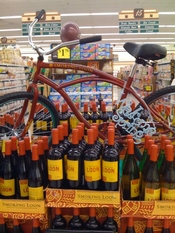There was wine news this week that will very likely affect the wines you see on the shelf the next time you head into your local wine shop.
Constellation Brands, the world’s largest wine and spirits company, announced a consolidation in the number of companies they do business with. Now just four will distribute their products to the fifty states. Two of these, Southern Wine & Spirits and Republic National Distributing, won the distribution rights to practically all of the country’s largest markets, including California, New York, Illinois, Pennsylvania, Florida, Arizona and Texas.
So now the world’s largest wine and spirits company is going to be distributed in the country’s most populous states by the country’s largest wine and spirits distributors. If you’re a small brand or wine import company already represented by a distributor like Southern, get ready to suck in your gut: a very large gorilla has crashed into the room.
Like so many other sectors of the economy, consolidation is changing the face of the wine industry. Such developments may serve corporate interests, but it will almost certainly mean a loss of choice for consumers.
“This is a predictable scenario,” a small importer told me from his office in Southern California, whose wines are distributed in some states by Republic National. “They’ll be obligated to create a division or team to manage that portfolio; Constellation wouldn’t expect anything less. The focus will be to restructure and accommodate their new investment and business partner. When that happens, we cannot possibly get the attention we need.”
Like everyone else in the business, the importer is doing his best to compete in an economy where sales are sluggish and the market is stagnant. But now he’s feeling the pinch from his distributors (traditionally his advocate in the market) who, faced with huge inventory costs, are pressuring him to allow them to drop some of his brands as they try to unburden themselves of the number of wines they’re responsible for.
Part of the problem, for distributors and importers alike, is the degree of consolidation that has occurred in two of the three tiers that bring wines to market. Wine companies like Constellation now own or control more than 100 wine brands, representing many hundreds of SKUs. Gallo and Kendall-Jackson, while not quite as large, wield comparable influence.
To move wine, these companies and others (like Bronco, which produces Charles Shaw and other brands, and Casella, which produces Yellow Tail) are in the business of creating and marketing brands that are eye-catching and fun, brands with clever packaging and flashy, cartoonish labels.
There’s nothing wrong with clever packaging, or with good marketing. But too often the package is there to disguise the lack of imagination, even the cynicism contained in the bottle or box. Where it comes from, and even what it tastes like, is irrelevant. It doesn’t have to be interesting or good. It just has to sell. For many of these large companies, wine is just a widget with a kick.
The marketing campaigns themselves can be at once hilarious and depressingly cynical. Just this spring I walked into a grocery store in Los Angeles and found a display for Smoking Loon (owned by Don Sebastiani & Sons, and one of the many nonsensical “critter wines” that grace supermarket shelves) which employed, of all things, a red bicycle, echoing of course another supermarket brand called Red Bicyclette, owned by Gallo. This bizarre appropriation of one meaningless trope to serve another just proves the point that what’s actually in the bottle is the least of the producer’s concerns.
Sebastiani & Sons, and one of the many nonsensical “critter wines” that grace supermarket shelves) which employed, of all things, a red bicycle, echoing of course another supermarket brand called Red Bicyclette, owned by Gallo. This bizarre appropriation of one meaningless trope to serve another just proves the point that what’s actually in the bottle is the least of the producer’s concerns.
At the same time, distribution companies are consolidating at an alarming rate, and are responsible for the selling and marketing of thousands of wines, in mega-portfolios — even as the economic downturn forces drastic cuts in the average sales force. It’s become increasingly common for smaller brands to face stiff competition not only in the market, but within a wholesaler’s portfolio. With more wine in the hands of fewer companies, not everyone can get the attention they need or deserve. And when an 800-pound gorilla like Constellation has just bounded into the room, it’s the smaller brands that are liable to get squished.
Remember this the next time you’re out in the wine shop fingering bottles. The American appetite for the new has resulted in a selection that’s unlike any other. It’s broader, richer, more adventurous, more multifarious, and more exciting than any other wine market in the world. And it’s expanding all the time. You have in your hands a freedom of choice here that is unparalleled. That can certainly include a critter or two, or some of the many wines offered by the ‘bigs.’
But it’s vital that you exercise your right to choose. It’s up to you to put a face on the wines you love to drink, so that it’s more than a cute name or the product of a great campaign. Wine doesn’t need to be reduced to being a widget. Few products that come from the earth have more stories to tell. Which one are you going to listen to?
